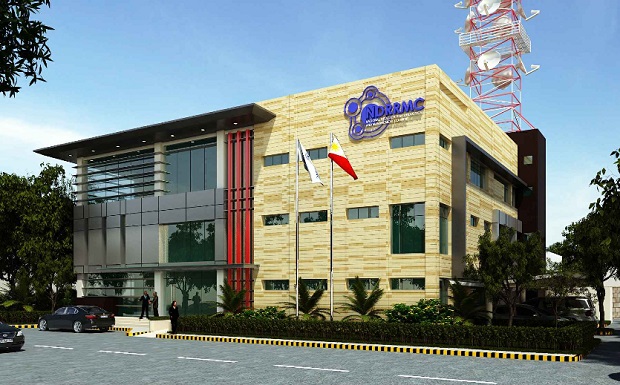
The NDRRMC headquarters in Camp Aguinaldo (Photo from NDRRMC)
MANILA, Philippines — The National Disaster Risk Reduction and Management Council (NDRRMC) on Wednesday said it was ready to hold bigger responsibilities in responding to the pandemic by taking over the role of the National Task Force Against COVID-19 (NTF) as the country faces an increase in new infections fueled by a more contagious Omicron subvariant.
Malacañang announced on Monday that the NDRRMC would now be the implementing arm of the Inter-Agency Task Force for the Management of Emerging Infectious Diseases (IATF), the temporary body overseeing the government’s response to the pandemic
It said the NDRRMC platform would replace the NTF to “integrate” the former task force with the “regular processes” of the disaster council.
The new administration of President Ferdinand Marcos Jr. is trying to streamline the bureaucracy left by President Rodrigo Duterte as the country tries to recover from the economic impact of the pandemic.
NDRRMC Executive Director Ricardo Jalad said there would not be a lot of difference between the NTF and the NDRRMC. The IATF, led by the Department of Health (DOH), would still perform the lead role in the country’s pandemic response, he said.
“We are ready, because the NDRRMC and the NTF are composed of the same agencies. The NTF chairperson is the NDRRMC chairperson as well,” he said in an interview with Teleradyo on Wednesday.
“The names just changed, but the DOH would still lead us because this is a health-related problem,” he said.
Then Defense Secretary Delfin Lorenzana was appointed to lead the task force in March 2020 at the onset of the pandemic.
The task force was created to implement the National Action Plan, the government’s overall strategy in dealing with COVID-19.
As defense secretary, Lorenzana was also the chair of the NDRRMC.
His successor, DND officer in charge Undersecretary Jose Faustino Jr., will also lead the replaced NTF as head of the NDRRMC.
Retain or reconfigure
Jalad said that there would be discussions on whether they would retain or reconfigure the organizational structure of the NTF.
“In the previous structure, there are groups like task group resource management and logistics, task force facilities. So, what will we do with them? We will discuss that in our meetings,” he said.
NDRRMC spokesperson Mark Timbal told the Inquirer that the council had no public health emergency unit to deal with any pandemic.
“We support all efforts of the DOH regarding the health emergencies like what we did in the dengue and COVID-19 operations, providing available assets and personnel that are needed,” he said. “DOH remains as lead for health emergencies.”
“With the NTF’s functions being transferred to NDRRMC, we will follow the existing coordination and management arrangements between agencies based on our respective mandates,” he said.
The NDRRMC is made up of several government, nongovernmental and other agencies tasked with ensuring the people’s welfare during calamities and other emergencies.
It was established by Republic Act No. 10121 of 2010 to provide a “comprehensive, all-hazard, multi-sectoral, inter-agency, and community-based approach to disaster risk management.”
Jalad said he was confident that the NDRRMC can handle both the pandemic and natural calamities.
Upswing in cases
The move to streamline the pandemic response agencies came with the upswing in COVID-19 cases.
The latest DOH data show that daily cases in Metro Manila averaged 900 over the past week, up from around 650 in the previous week.
The figures for hospital admissions also rose, with 2,947 for mild and 2,348 moderate cases nationwide. Hospitalization for severe and critical cases remains around 600.
In her first in-person press conference since the pandemic began in 2020, DOH officer in charge Maria Rosario Vergeire said on Wednesday that current data and forecasts indicated that cases and hospitalizations would continue to rise until September and had not yet peaked.
The DOH does not expect the increase in COVID-19 infections to “peak” or “plateau” in the coming days, the health undersecretary and spokesperson said.
“When you say peak, you expect [cases] to go down and we’re not seeing that in our data,” she told reporters.
This was contrary to findings by the independent pandemic monitor OCTA Research, which saw that infections were already peaking or may have peaked in Metro Manila. But one of its fellows, Guido David, said reaching the peak could be delayed if cases continued to spike.
Vergeire contradicted an earlier statement of another OCTA fellow, Fr. Nicanor Austriaco, that the rise in cases was driven by BA.5, one of the more transmissible Omicron sublineages.
“We always say that transmission of the [virus] would always be based on several factors, not just one, and BA.5 and other subvariants are part of these contributing factors,” Vergeire said.
Other factors were the increasing mobility of the population compounded by the reduced compliance to minimum public health standards and waning immunity from the coronavirus, she said.
—WITH A REPORT FROM KATHLEEN DE VILLA
RELATED STORIES
COVID-19 task force transfers functions to NDRRMC
NDRRMC says it is ready to replace nat’l task force vs COVID-19